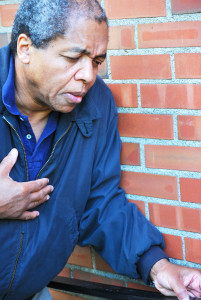A Stroke can be devastating, but it is also treatable—and often preventable. Recovering from a stroke can involve making big changes to your lifestyle, but your health care team will work to help you become as healthy and independent as possible. Learn what to expect if you are recovering from a stroke and how to prevent another stroke from happening1. Jay Harold’s Post, “3 Steps to Stroke Recovery & 4 Reasons to Call 9-1-1,” provides useful information.
Why is this important to African Americans? Here’s a couple of facts2 that should give you pause:
- African American men are twice as likely to have a stroke as their white adult counterparts.
- Black men are 60 percent more likely to die from a stroke than their white adult counterparts.
A stroke happens when something blocks blood supply to part of the brain or when a blood vessel in the brain bursts. When a stroke happens, brain cells start to die within minutes because they can’t get oxygen. This can cause death or disability. That is why doctors say “time lost is brain lost” when it comes to stroke. The faster you can get treatment, the less brain damage you may have. Each year, nearly 800,000 Americans have a stroke. Yet many people who could benefit from emergency stroke treatment—a special clot-busting drug—don’t get it because they don’t arrive at the hospital in time3.
Learn about the key steps to stroke recovery, including how to lower your risk of having another stroke.
Step 1: Recognize Stroke and Call 9-1-1
Many people do not realize when they are having a stroke4. They may mistake their symptoms for something else, downplay their symptoms, or wait for their symptoms to go away. In fact, 1 in 3 people having a stroke does not call an ambulance. Not calling 9-1-1 greatly increases the risk for disability and death when you are having a stroke.
Learn to recognize stroke so you can act F.A.S.T. to get treatment.
 Call 9-1-1 right away if you notice these symptoms in yourself or someone else:
Call 9-1-1 right away if you notice these symptoms in yourself or someone else:
- Sudden numbness or weakness in the face, arm, or leg, especially on one side of the body
- Sudden confusion, trouble speaking, or difficulty understanding speech
- Sudden trouble seeing in one or both eyes
- Sudden trouble walking, dizziness, loss of balance, or lack of coordination
- Sudden severe headache with no known cause
43 reasons why it’s better to call 9-1-1
- EMS gets you to the hospital faster. You may think that you’ll get to the hospital faster if you drive yourself or have a loved one drive you during a stroke. But the truth is, the EMS professionals on board may be able to start your treatment right away. Think of calling 9-1-1 as bringing emergency room resources to your door. Ambulance drivers also have the right of way when they use lights and sirens.
- EMS saves precious time once you reach the hospital. You are more likely to be treated quicker at the hospital when you arrive by ambulance. This is because, on the way to the hospital, EMS professionals begin your treatment by:
- Screening you for stroke symptoms.
- Monitoring your heart rate and blood pressure.
- Getting information about any medicines you take, your medical history, or other important information a medical team needs to know.
- Calling ahead to the hospital to let the medical team know a stroke patient is arriving. This gives the hospital team time to prepare equipment and medicines that you may need.
 You can get an important drug to treat stroke if you call 9-1-1. When it comes to stroke, time lost is brain lost. Every minute a stroke goes untreated; a patient loses nearly 2 million brain cells. Because stroke is often caused by a blood clot, a clot-busting drug such as alteplase is an effective treatment if you get to the hospital in time. But clot-busting drugs can only be given to patients within 3 hours of a stroke. EMS professionals responding to a 9-1-1 call about stroke will ask the patient and any bystanders questions about when the symptoms started, giving the medical team critical information about whether the patient can be treated with the clot-busting drug. At the hospital, you are also more likely to get alteplase if you arrive by ambulance. Many stroke patients who need the drug don’t get it, because they wait too long to call 9-1-1 or get to the hospital too late for treatment.
You can get an important drug to treat stroke if you call 9-1-1. When it comes to stroke, time lost is brain lost. Every minute a stroke goes untreated; a patient loses nearly 2 million brain cells. Because stroke is often caused by a blood clot, a clot-busting drug such as alteplase is an effective treatment if you get to the hospital in time. But clot-busting drugs can only be given to patients within 3 hours of a stroke. EMS professionals responding to a 9-1-1 call about stroke will ask the patient and any bystanders questions about when the symptoms started, giving the medical team critical information about whether the patient can be treated with the clot-busting drug. At the hospital, you are also more likely to get alteplase if you arrive by ambulance. Many stroke patients who need the drug don’t get it, because they wait too long to call 9-1-1 or get to the hospital too late for treatment.- EMS can get you to a hospital that specializes in stroke treatment. When a stroke happens, getting to any hospital is important. But some hospitals are better equipped than others to treat stroke patients. Hospitals that specialize in stroke, like certified stroke centers, have developed standards of care for stroke patients and may have more staff, medicine, and equipment for treating stroke on hand. There are more than 1,000 certified stroke centers nationwide.
A stroke happens to nearly 800,000 Americans a year. Don’t hesitate to call 9-1-1 right away if you suspect a stroke is happening to you or someone else because that is the best chance at survival, treatment, and recovery.
Step 2: Know That Stroke Can Change Your Life
Stroke is a major cause of disability in the United States. More than 7 million Americans have had a stroke, and many of them have problems walking, talking, and thinking as a result. Many people also have trouble with their emotions after a stroke, including depression. This may happen because the areas of the brain that control these actions and emotions have been damaged.
After a stroke, you may need to relearn how to talk or walk. You may need to take time off work or have someone help you at home to cook, bathe, or dress. This recovery process can be stressful and frustrating. That’s why it is so important to get to the hospital quickly when stroke happens. The sooner you get emergency treatment, the less brain damage you may have. This means a better, faster recovery.

Step 3: Take Steps to Prevent Another Stroke
After a stroke, your health care team may recommend medicines and a rehabilitation program to help you recover from stroke and prevent another stroke from happening. You may also need to make changes in your behaviors to help lower your risk for another stroke or other problems.
- Medicines and rehabilitation therapy can help you recover. You may need to take medicines to thin your blood, prevent blood clots, lower blood pressure, or manage blood cholesterol. Your rehabilitation team may include physical or occupational therapists to help you relearn how to use your muscles and gain independence in daily activities, such as getting dressed and eating. You may also need to see a speech therapist, who can help you with problems speaking or understanding words. Social workers can help you find care services and caregiver support to continue your long-term recovery. Rehabilitation therapy may happen at a hospital, a stroke rehabilitation center, or your home.
- Rehabilitation only goes so far. In addition to working with your health care team to take your medicines as directed and work with rehabilitation therapists, you may need to make other changes in your life. For example, if you smoke, you will need to quit smoking, you will need to eat less sodium, and you will need to commit to being more physically active. These changes can significantly reduce your risk of another stroke.
- Recovery takes time. Having a support system in place, including your health care team, family, and friends, can improve your recovery experience and help you recover faster. Ask questions and reach out for help if you are struggling or need more resources.
Enjoyed this post? Share it and read more here. Jay Harold has put together a Resource page that you may find useful when trying to improve your health and wealth. Please take this advice from Muhammad Ali and give back to others. “Service to others is the rent you pay for your room here on earth.”




